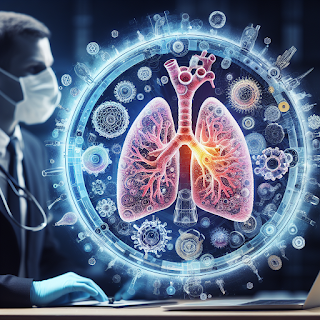Respiratory syncytial virus (RSV) is a common virus that infects the lungs and respiratory tract. It can cause mild symptoms like a cold, or severe complications like pneumonia or bronchiolitis. In this blog post, we will unveil the symptoms, diagnosis, and response to RSV infection.
Symptoms of RSV infection
RSV symptoms usually appear about four to six
days after exposure to the virus. They vary depending on the age and health
condition of the person. In adults and older children, RSV symptoms are mild
and may include:
- Congested or runny nose
- Dry cough
- Low-grade fever
- Sore throat
- Sneezing
- Headache
In infants and young children, especially those who are premature or have chronic heart or lung problems, RSV symptoms can be severe and may include:
- High fever
- Severe cough
- Wheezing
- Rapid or difficulty breathing
- Bluish color of the skin due to lack of oxygen
- Poor feeding
- Unusual tiredness or irritability
Most people recover from RSV infection in one to two weeks, but some may have repeated wheezing or asthma later in life.
Diagnosis of RSV infection
RSV infection can be diagnosed by a doctor based on the symptoms and physical examination of the person. Sometimes, a nasal swab or a blood test may be done to confirm the presence of the virus or to rule out other causes of respiratory illness.
RSV infection can be confused with COVID-19, as both are respiratory viruses that can cause similar symptoms. However, COVID-19 may cause more severe symptoms in adults, such as trouble breathing, chest pain, or loss of taste or smell. If you have symptoms of a respiratory illness, you should contact your doctor and get tested for COVID-19.
Treatment of RSV infection
There is no specific treatment for RSV infection. Most cases can be managed at home with self-care measures, such as:
- Drinking plenty of fluids to prevent dehydration
- Using a humidifier or a saline nasal spray to ease congestion
- Taking over-the-counter pain relievers or fever reducers as needed
- Avoiding smoking or exposure to secondhand smoke
However, some people may need hospitalization if they have severe RSV infection that causes breathing problems, dehydration, or low oxygen levels. In the hospital, they may receive:
- Oxygen therapy to improve oxygen delivery
- Intravenous fluids to prevent dehydration
- Antiviral medication to reduce viral load
- Antibiotics to treat secondary bacterial infections
Prevention of RSV infection
RSV infection can be prevented by taking some simple steps, such as:
- Washing your hands frequently with soap and water or using an alcohol-based hand sanitizer
- Covering your mouth and nose when you cough or sneeze and disposing of used tissues properly
- Avoiding close contact with people who are sick or have symptoms of RSV infection
- Cleaning and disinfecting frequently touched surfaces and objects
- Getting vaccinated for COVID-19 and influenza, as these can lower your immunity and increase your risk of getting RSV infection
Additionally, some people who are at high risk of severe RSV infection may benefit from preventive options, such as:
- An RSV vaccine that is available for adults aged 60 years or older that can protect them from severe RSV disease
- An RSV vaccine that can be given to pregnant women between 32–36 weeks of gestation that can protect their infants after birth from severe RSV disease
- A preventive antibody that can be given to infants after birth who are premature or have chronic heart or lung problems that can reduce their chances of getting severe RSV disease
Conclusion
RSV is a common virus that can cause mild to
severe respiratory infections. It can affect anyone, but it is more dangerous
for infants and older adults. By knowing the symptoms, diagnosis, and response
to RSV infection, you can take steps to protect yourself and your loved ones
from this virus.

Comments
Post a Comment